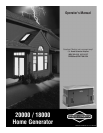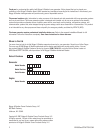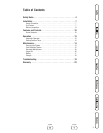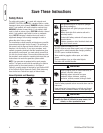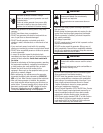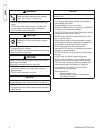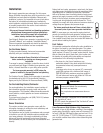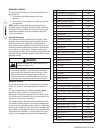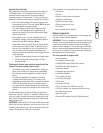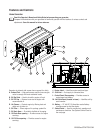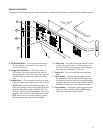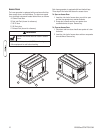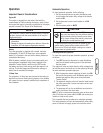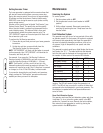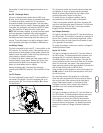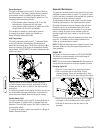
7
Installation
We sincerely appreciate your patronage. For this reason,
Briggs & Stratton has made every effort to provide for a safe,
streamlined and cost-effective installation. Because each
installation is unique, it is impossible to know of and advise
the trade of all conceivable procedures and methods by
which installation might be achieved. Neither could we know
of possible hazards and/or the results of each method or
procedure. For these reasons,
Only current licensed electrical and plumbing contractors
should attempt home generator system installations.
Installations must strictly comply with all applicable
codes, industry standards and regulations.
Your Briggs & Stratton home generator is supplied with this
“Operator’s Manual” and a separate “Installation Manual”.
These are important documents and should be retained by
the owner after the installation has been completed.
For the Home Owner:
To help you make informed choices and communicate
effectively with your installation contractor(s),
Read and understand Owner Orientation in this manual
before contracting or starting your home generator
installation.
To arrange for proper installation, contact the store at which
you purchased your Briggs & Stratton home generator, your
dealer, a licensed electrician or your utility power provider.
The home generator warranty is VOID unless the
system is installed by licensed electrical and plumbing
professionals.
The Emission Control System for this generator is warranted
for standards set by the U.S. Environmental Protection
Agency and by the California Air Resources Board (CARB).
For the Installing Dealer/Contractor:
For most applications, the Installation manual contains all
the information required to properly install and start the
home generator. This Operator’s Manual describes essential
circuit selection, routine operation and owner maintenance
procedures.
If you need more information, call (800) 743-4115, between
8:00 AM and 5:00 PM CT.
Owner Orientation
This section provides home generator owners with the
information necessary to achieve the most satisfactory and
cost effective installation possible.
The illustrations are for typical circumstances and are meant
to familiarize you with the installation options available with
your home generator. A thorough understanding of these
options will provide fundamental control over the cost of
your installation, as well as ensure your final satisfaction and
security.
Federal and local codes, appearance, noise levels, fuel types,
and distances are the factors that must be considered when
negotiating with an installation professional. Remember
that as the distance from the existing electrical service and
gaseous fuel supply increases, and the number of 90 degree
bends in the fuel supply increases; equal compensations
in piping and wiring materials must be allowed for. This is
necessary to comply with local codes and overcome electrical
voltage drops and gaseous fuel pressure drops.
The factors mentioned above will have a direct affect on
the overall price of your home generator installation.
NOTE: In some areas you may need to acquire electrical
permits for installing the home generator, building permits
for installing gas lines, and permits for noise allowances.
Your installer should check your local codes AND obtain the
permits before installing the system.
Fuel Factors
An important consideration affecting the entire installation is
the type of fuel used by your home generator. The system
was factory tested and adjusted using either natural gas or
liquid propane (LP vapor). For proper engine function, factors
that are inherent to each of these fuels, your location and
the duration of possible utility interruptions are important
considerations in the following fuel guidelines:
• Use clean, dry fuel, free of moisture or any
particulate material. Using fuels outside the following
recommended values may cause performance
problems.
• In engines set up to run on propane (LP), commercial
grade HD5 propane with a minimum fuel energy of
2500 BTUs/ft3 with maximum propylene content of
5% and butane and heavier gas content of 2.5% and
minimum propane content of 90%.
WARNING
Propane and Natural Gas are extremely
flammable and explosive.
Fire or explosion can cause severe burns or
death.
The home generator is equipped with an automatic safety
gas “fuel shut-off” valve.
DO NOT operate the equipment if the “fuel shut-off” valve
is missing or inoperative.
•
•
Power Decrease at High Altitude or High Temperature
Air density is less at high altitudes, resulting in less available
engine power. Specifically, engine power will decrease 3.5%
for each 1,000 feet (300 meters) above sea level and 1% for
each 10° F (5.6°C) above 77°F (25°C). Make sure you and
your installer consider these factors when determining total
generator load.



